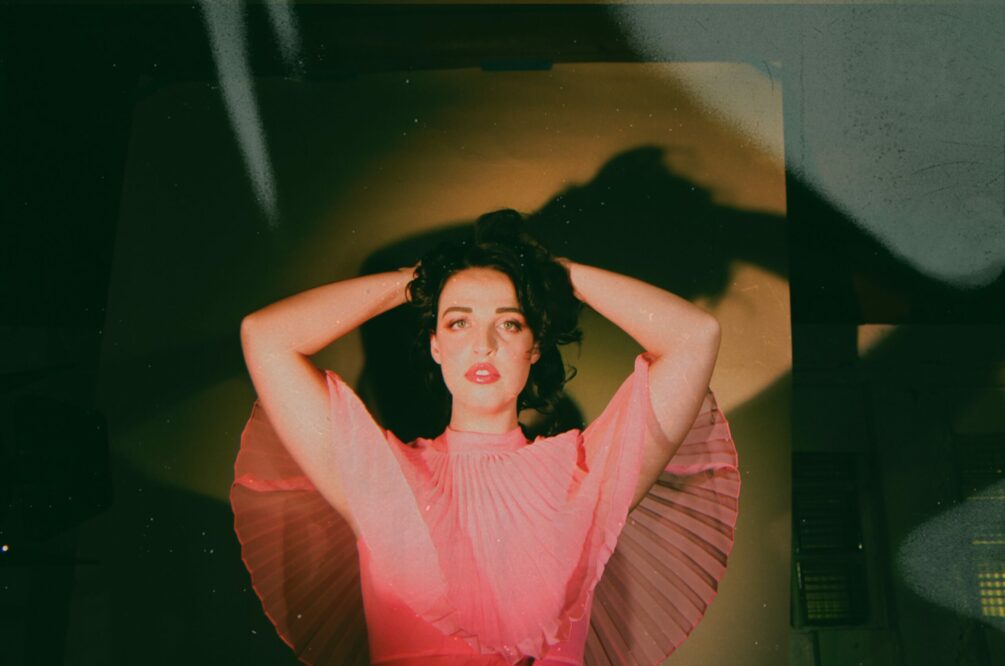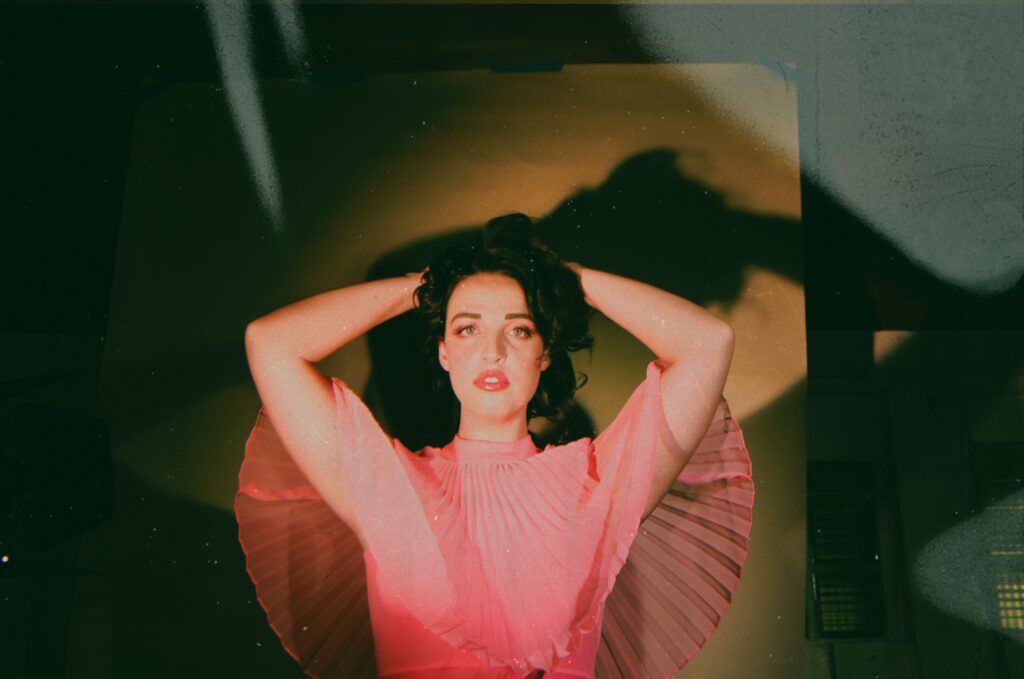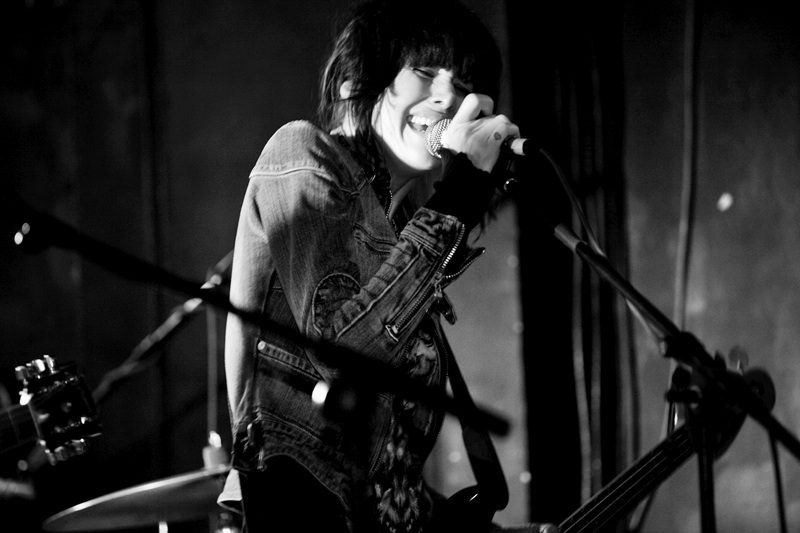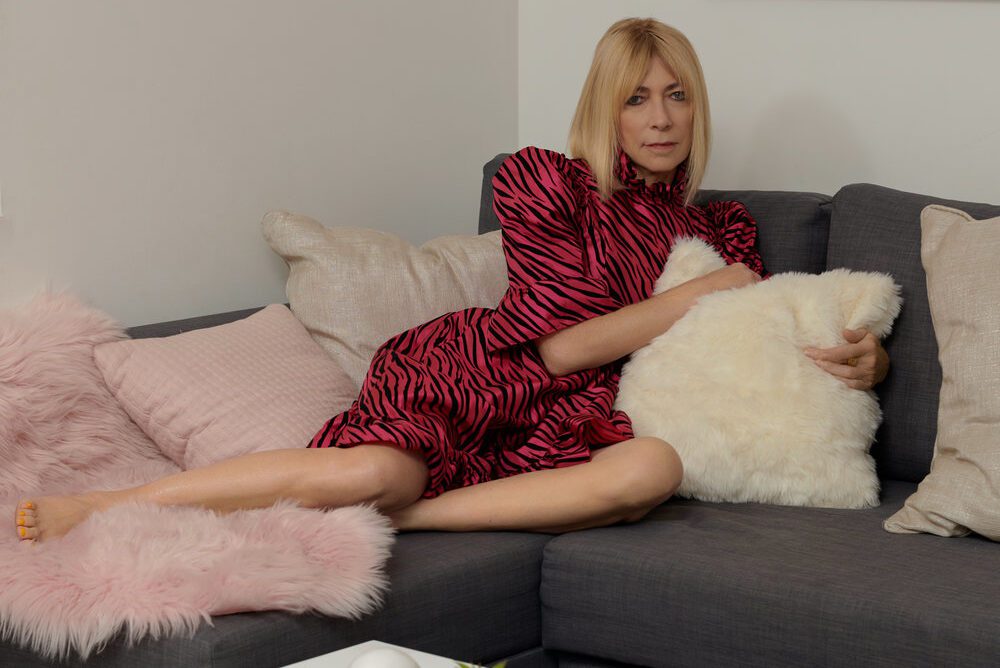PREMIERE: Elizabeth Moen Makes Space for Reflection with “Studio Apartment”


“The best way to break a habit is to call it what it is,” says Chicago-based singer-songwriter Elizabeth Moen. Over the last several months, she’s taken some time to examine her own holding patterns – especially those that have held her back – as she settles into city life, having recently relocated from Iowa City. And she has the receipts, in the form of a six-song EP, Creature of Habit, out December 11. Whether it’s falling into relationships of convenience, mindless snacking, or ordering takeout as though the world isn’t on a swift decline, Moen uses her witty, relatable lyricism to unravel the most tangled parts of her persona and braid them into something more beautiful.
So far, Moen has released the EP’s languid, minimalist title track, the twangy “Eating Chips,” and a contemplative folk ballad, “It’ll Get Tired Too.” Premiering today via Audiofemme is her latest single from Creature of Habit, “Studio Apartment,” a bluesy play-by-play of the “bad day, bored night, good timing” that leads to meeting someone at the bar and taking them home. “Oh wow, you seem just my type/Push me away if you loved me/Sure, we can head over to mine/Finish that thought in the morning, or the afternoon,” she sings, in a tone as casual as the affair she describes: “I’d like to think I know better than I do, but I do this all the time too.” She’s seemingly resigned to what’s about to happen, until she lets it all burst operatically forth in the first chorus: “No worries, I won’t fall for you/If we go back to my studio apartment/No view of the bridge or my dreams.”
It’s easier to coast when it’s so exhausting – and possibly disastrous – to want or work for something more. Potential creates complications; better to keep things simple, enclosed within four walls. While the song seems like a specific, personal glimpse into a moment of Moen’s life, we’ve all lived that same moment, felt that same feeling, down to the shit-show details in which Moen, having locked herself out, searches for a spare key while her love interest sways drunkenly in the hall.
That holds true across the entire EP – her intimate confessions make the songs easy to connect with, particularly for young women, whose ambitions and desires are often frowned on should we dare speak them aloud. But lying to yourself, Moen says, in an effort to convince yourself that everything is fine, dooms you to stay in your rut. “You can also be upset. I’m just realizing that now,” she says. “You do have to laugh at things, like, oh shit, I left my keys inside, wow that was dumb. But it’s also okay to not be okay and be mad. I feel like I, especially as a woman, never really had the space for those emotions.” And when you don’t have that emotional space, the four walls of your studio apartment can feel like they’re starting to close in on you.
For the most part, though, Moen hasn’t stayed in one place long enough to let that happen, living a nomadic life instead. She studied French and Spanish at the University of Iowa in the hopes of teaching abroad or working in international business, but also began singing covers at open mic nights. “It’d be me and my guitar, singing Johnny Cash and stuff,” Moen remembers. “Eventually, my friends were like, why don’t you write your own songs? And I was like, I can’t do that. And then one day I was just like, actually I can. You just stop telling yourself you can’t do it, and then you do it. I let go and I just started writing lyrics.” Moen finished her program, but the minute she graduated she set about learning to book shows and toured as much as possible, headlining Lincoln Hall in Chicago and supporting artists like Lake Street Dive, Margaret Glaspy, and Buck Meek.
She released three albums in as many years – her self-titled debut in 2016, followed by sophomore effort That’s All I Wanted in 2017 and A Million Miles Away in 2018. Constantly on the road to promote them, Moen crashed with random folks while touring, or friends and family if she needed an extended stay between gigs. She had another LP ready to go – a big, glossy, studio affair – and had even dropped a few singles from it (“Headgear” and “Ex’s House Party“); she was scheduled to head to SXSW and launch another tour from there in March when the pandemic took hold, dashing those plans.
For a musician like Moen, whose identity and career trajectory was wrapped up in playing live, the blow could have been devastating. But Moen took it as a sign that it was time to pause and maybe put down some roots. “Impostor syndrome is real, and the one time I’ve never felt impostor syndrome is when I’m on stage,” she says. “Quarantine has been a bit of a beautiful awakening of owning it more, [saying] you are still doing what you do, and you are more than just a show machine. It’s been kind of a necessary chapter in my life – really hard, but also, there are some things I’m thankful for, like learning more about my own brain and just being a person.”
After a brief stay in an attic room with spotty Wi-fi, Moen temporarily moved into her aunt’s basement. The two are close in age – Moen says it felt like staying with an older sister – and because her aunt is a therapist, the singer took the opportunity to learn more about the inner workings of her own mind. “She would never therapize me when I was staying with her. She’s very good about that,” she says. “But whenever I was feeling low or like, just curious about therapy, I would ask her questions. I think mental health is an important and fascinating subject, and I was living with a therapist, so I was like, well, this is a perfect person to talk to about this sort of stuff.”
Moen was also inspired by hanging out with her aunt’s three young sons, and says tender EP cut “It’ll Get Tired Too” was inspired by the way even their most ardent feelings seemed to come and go. “Their emotions are pretty straight forward – they can’t really hide their emotions yet,” Moen points out. “As a touring musician I haven’t been around kids a lot. Being with three kids during quarantine was intense, but I really got back in tune with how awesome kids are.” Moen also took long walks in the woods, examining some complex emotions of her own and staring down her most dysfunctional tendencies. Though they weren’t necessarily affecting her life in a negative way just yet, she knew that letting those habits take root could spell trouble.
“That’s what the EP is about. The song ‘Creature of Habit’ is definitely about realizing you can’t just be single, you’re always dating someone. Realizing I am so focused on finding someone else to be with [because] I’m trying to not be with myself,” she explains. “Late at night I like to drink, and I use it as an excuse to text and flirt, maybe hop on the apps. There’s nothing wrong with the apps, but it’s like, why do I have to have a couple glasses of wine before I do that, you know? I’m realizing that was a pattern.”
While “Studio Apartment” narrates a one-night stand, it’s not just about the guy she’s settled for that night, or the beer that’s just alright, or the too-cramped living quarters – it’s the life she’s settled for, the mediocrity we all settle for as we stumble toward our dreams. “A habit of mine – and I was also thinking about habits of other people too – we need quick fixes because maybe we’re scared of the real thing,” Moen says.
But Creature of Habit is also notable for the new practices Moen picked up while she was making it. She started exploring synths and keyboards; better suited for bedroom recording than guitars and amps, Moen felt more freedom to “make weird and horrible noises, alone in my headphones.” Avery Mossman, a friend who plays some additional synths on the EP, gave her some quick tutorials, and she was off to the races, noodling around and layering sounds. “I just didn’t have the mics and stuff that I felt comfortable using to track guitars and vocals at home, but with the keys and synth I borrowed, I could just plug it into my interface. I also never had an interface before quarantine!” she says. “It kind of reawakened [my creativity]. It made me feel the way I felt when I first started playing guitar.”
Ultimately, it gave the EP more electronic flourishes than her previous releases. Playing around with ProTools also taught Moen enough about engineering to be able to explain what she wanted to achieve with production and mixing when she was able to get studio time. And because she had to sing quietly so as not to wake her little cousins, Moen embraced her lower register, singing in the melodramatic style she imagined the male country stars she’d admired in the past might. When she posted an early version of “Creature of Habit” to Instagram, her friends asked why she didn’t sing that way more often.
“Sometimes I feel like as a singer, the higher I can go and the stronger I can belt that high part of my register, the more impressive it is, but actually, I think people honing that low part of their voice – particularly female voices – is cool,” she says. “I finally did that with this EP. But ‘Studio Apartment’ was definitely the one where I was like, nah, I’m still gonna belt it up there though.”
Follow Elizabeth Moen on Facebook and Instagram for ongoing updates.




